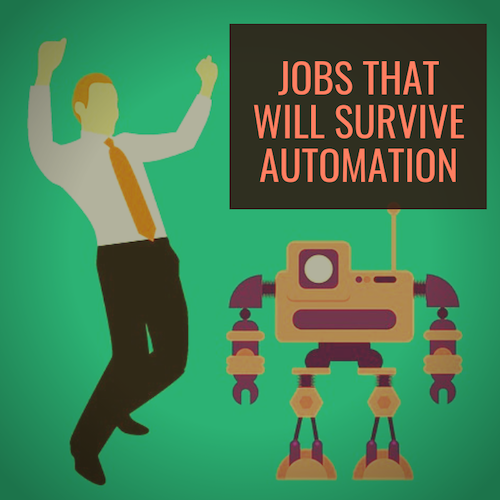Most of the corporate workforce sees automation as this big monster that gobbles up humans, or rather, their jobs. There is no doubt that the automation wave is getting stronger day by day. With the media sharing scary statistics day in and day out, it is no longer hard to believe headlines announcing loss of millions of jobs to machines and artificial intelligence. But it is time to look at the bright side. Millions of jobs will also be created.
Not everything can be done by machines. Therefore, for those who wish to protect their careers, the best strategy is to become competent in the fields where machines will be less effective. After all, machines cannot solve complex problems nor can they be creative. These are areas where the human touch is indispensable.
According to a World Economic Forum report, despite automation taking over corporate functions, humans will still be required for the following tasks:
To solve complex problems and come up with creative solutions to issues expected to arise in the future
These solutions have to be creatively thought out in advance, based on the relationships between businesses and industries.
To critically interpret data
Data will need to be presented in a more understandable form, giving meaningful insights, given the complicated relationships between various fields, such as IT, engineering, biology and so on.
To come up with creative out-of-the-box ideas
Minds will be required to brainstorm and generate random ideas that can shape the future.
To communicate and coordinate
Those most in demand will have to possess exceptional communication skills and the ability to work in teams and coordinate with others effectively.
Going by the nature of the tasks, there will be no dearth of jobs for data analysts, medical technicians, physical therapists, and workplace ergonomics experts. Specialists in sales and marketing need not fear either.Machines cannot replace teachers, trainers or veterinarians, can they? Customer service executives will always be required to deal with clients and customers and respond to their queries. Brains will also be needed to make this automation happen, right? So there will be a requirement for software developers and computer programmers. Other jobs that will not lose their importance completely are that of management analysts, accountants as well as auditors.
To hire intelligently
This cannot be done without some bit of curiosity and empathy. Therefore, people will need to have high levels of emotional intelligence.
To make decisions based on data
It is not easy to analyse and interpret huge volumes of data, understand its implications and then make important business decisions based on the insights. Therefore, the worker of the future will have to possess skills fast and sometimes on-the-spot decision-making.
To offer customer service
There will be no dearth of jobs wherein customers will have to be provided value and assistance. Seek a career in service-oriented professions.
To negotiate
All businesses will need people with negotiation skills. People capable of negotiating with businesses and convincing them of the ways in which they will stand to gain will be much sought after.
To manage people
Machines cannot lead, manage or guide teams. These skills will always be required no matter how many machines enter the workplace.
To don different hats
More than multitaskers, what businesses will look forward to are people who can switch personalities and attitudes according to the situations. This is particularly significant in combination industries that are fraught with challenges.
THE SILVER LINING
Going by the nature of the tasks just mentioned, there will be no dearth of jobs for data analysts, medical technicians, physical therapists, and workplace ergonomics experts. Specialists in sales and marketing need not fear either.
Machines cannot replace teachers, trainers or veterinarians, can they? Sales and customer service executives will always be required to deal with clients and customers and respond to their queries. Brains will also be needed to make this automation happen, right? So there will be a requirement for software developers and computer programmers. Other jobs that will not lose their importance completely are that of management analysts, accountants as well as auditors.
While automation is going to bring about a huge shift in the way businesses and economies function, its impact will vary from geography to geography and industry to industry. For instance, more financial advisors will be required in some parts of the world, such as East Asia. On the other hand, information security analysts will be in demand in eastern European nations. Workers in assembly line jobs and factories will continue to be in demand in the Middle East, South America and South Asia.
Irrespective of the rise of automation, the human touch is something that will always be sought.



